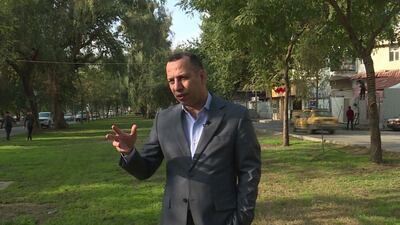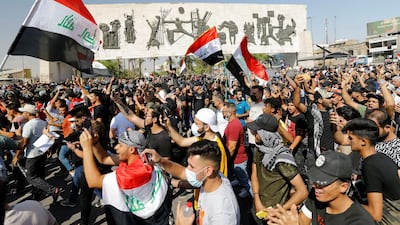Investigations into the killings of political activists in Iraq since the start of the latest round of protests have failed to produce a single trial or prosecution, the UN has found.
Arrest warrants have been issued against suspects in limited numbers, the UN Assistance Mission for Iraq – known as Unami – said in the report, which covers the anti-government protests which began in October 2019.
“The rights of many victims and their families to truth, justice, redress and reparation have not been fully respected,” the report said.
Titled Accountability for Human Rights Violations and Abuses by Unidentified Armed Elements, the report documents a range of human rights violations and abuses carried out by state security forces and unknown militia groups, many of which operate outside state control and have links to political parties.
The targeting of political activists, human rights defenders and prominent protesters by armed groups is not a new trend in Iraq.
Human rights violations have included the excessive use of force, arbitrary detention and related ill-treatment and torture, and interference with freedom of expression – including restrictions on internet access and on media outlets reporting on demonstrations.
However, the number and scope of incidents increased after October 2019 as demonstrators took to the streets across central and southern Iraq to vent their anger at the country's political system. This is perceived by many as corrupt and unable to provide even basic services.
At least 500 protesters have been killed since these mass demonstrations began.
Between October 1, 2019 and May 15, 2021, Unami documented 48 attacks targeting protesters and activists – mostly shootings carried out by militias.
The wave of violence in response to the demonstrations – often targeting protest leaders – has resulted in at least 32 deaths and injuries to 21.
“Although there have been several arrests related to targeted killings, not a single case appears to have moved beyond the investigative phase,” the report said.
In response to human rights violations and abuses linked to these demonstrations, the government has established a judicial investigative and fact-finding committee, issued condemnatory statements and established a compensation fund for the families of victims.
But the process to obtain compensation can be lengthy and burdensome for the families of persons killed, as it often requires the submission of multiple officially certified documents and attending interviews before judges.
Mohammed Al Janabi, a spokesman for the Iraqi government's investigative committee, told The National that revealing the names of protesters' killers would take a long time.
Investigators, he said, must sift through all the documents issued by the security, health and judicial authorities and to listen to all those involved.
"The legal and the judicial process needs to check every document, criminal evidence, forensic report, law suit and listen to eyewitness and victims' families in order to reach a solid and fair decision to be referred to the court without mistakes or false accusations."
The five-judge committee was established last October.
"Since then, it has checked more than 7,000 judicial documents and investigated 112 officers and security personnel from the interior and defence ministries who were accused of killing or injuring protesters," Mr Al Janabi said.
The report also said the space for freedom of expression has significantly deteriorated, leading many people to self-censor and others to relocate outside of Iraq.
"At least 20 protesters abducted by militias remain missing, without any apparent efforts to locate and release them or determine their fate," it said.
Prime Minister Mustafa Al Kadhimi, who has pledged early elections in October, has blamed groups "outside the law" for the targeted killings and vowed to punish those responsible.











